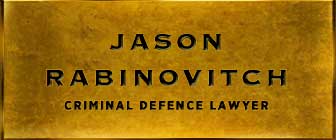Bail Hearings
When a person is arrested and charged with a criminal offence, it is subject to the discretion of the police as to whether the accused person will be released from the police station on their own signature, or whether they will be held for a bail hearing where a Justice of the Peace will determine if they should be released and under what conditions.
A release may be ordered in one of several forms:
(1) A person may be released on an undertaking or recognizance on their own signature;
(2) A person may be released under the supervision of a surety. This is a person who will act as a guarantor to the Court that the accused person will stay out of trouble and will follow any conditions set on the accused person by the Court;
(3) A person may be released upon depositing a sum of money with the Court. This is usually used in cases where the accused person in non-resident in Canada and where there is a concern that he may not return to the jurisdiction if released.
Does Jason defend in my local court?
What other offences does Jason handle?

In most cases, the onus is on the Crown to show that the accused person should be detained in custody pending the hearing of the matter. Where the accused person is already subject to a release in relation to an indictable matter, or is charged with certain very serious offences, the onus shifts to the accused person to show to the Court why a released is justified.
Where a surety is being proposed to sign for the accused person, the Court will need be satisfied that the proposed surety understands his obligations – to supervise the accused as required, to insure absolute compliance with the bail order, and to report to the police any misconduct or breach of the Court order. The surety should also be an individual with no criminal record (although this is not an absolute rule), no outstanding charges, preferably not acting as a surety for another person, and be able to meet the financial requirements of the surety. While a surety does not have to deposit funds with the Court, there is a monetary amount attached to the release. It is set by the Court, and if the surety does not fulfill his obligations, the Court could order that he be liable for up to the amount of the surety as penalty.



